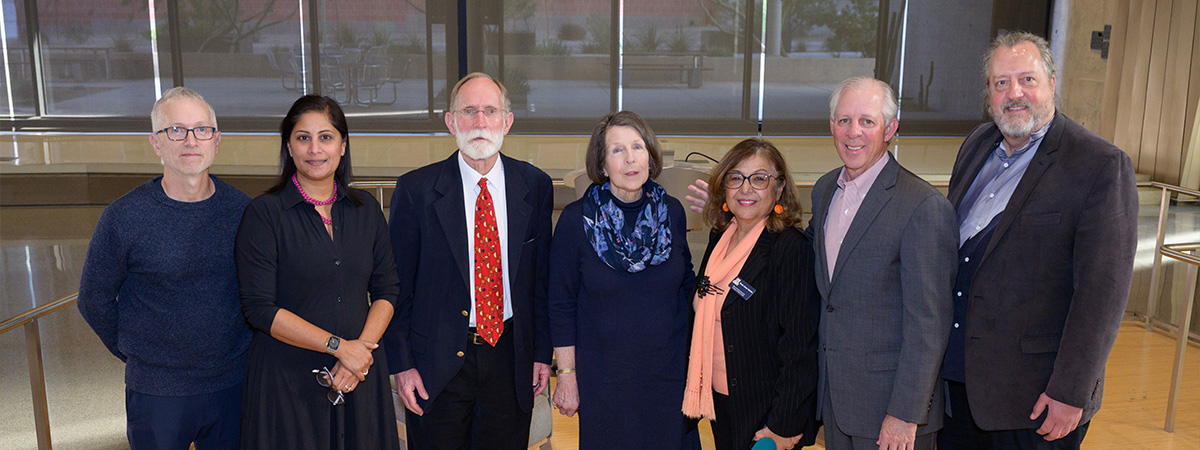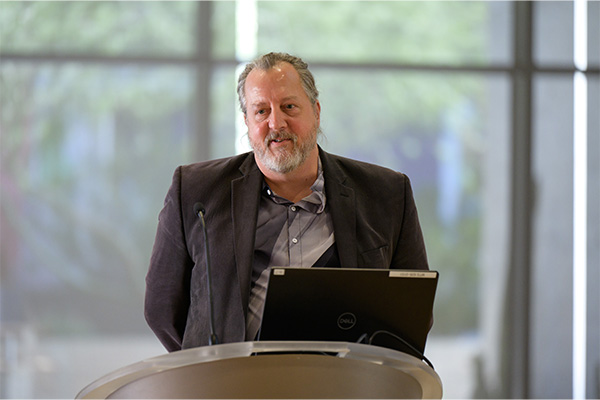Dr. Peter Agre, Nobel Laureate, Gives Keynote Presentation for One Health Symposium

At the Spring 2024 One Health Symposium, Nobel Laureate Dr. Peter Agre gave the keynote presentation on aquaporin water channels and One Health, and participated in workshops with Arizona researchers.
At the One Health Symposium hosted by the University of Arizona Health Sciences and the Zuckerman College of Public Health on February 12, 2024, researchers came together to discuss One Health challenges and solutions. Peter Agre, MD, professor in the Bloomberg School of Public Health at Johns Hopkins University, gave the keynote presentation titled Aquaporin Water Channels and One Health. Dr. Agre received the 2003 Nobel Prize in Chemistry for his discovery of what he called the aquaporin proteins, which form the channels that enable water to flow in and out of cells. Dr. Agre also participated in workshops with Arizona researchers.
Additionally, representatives from the non-profit Ending Pandemics, a global leader in digital epidemiology, gave three presentations collectively titled From Pixels to Public Health: Pioneering One Health Disease Surveillance. The Ending Pandemics presenters included Mark Smolinski, MD, MPH, president, Nomita Divi, MSPH, executive director, and Onicio Leal Neto, PhD, MPH, who recently joined the Zuckerman College of Public Health as assistant professor and leads the digital disease surveillance platform Global Flu View for the college.
The One Health approach understands that human health is deeply interconnected with environmental health and animal health. One Health research uses an interdisciplinary and often community-based approach to solve complex health problems that emerge from environmental contamination, animal-to-human disease transmission, the impacts of climate change, and many other pressing issues.
What Are Aquaporins?
Referred to as the “plumbing system of cells,” aquaporins facilitate the movement of water molecules across cell membranes through a process called rapid osmosis, a process essential to all living organisms. Aquaporins are responsible for the generation of all biological fluids – cerebrospinal fluid, aqueous humor, tears, sweat, saliva, and the concentration of urine. Aquaporins are also a key component in plant biology and infectious disease.
The discovery of the water channel, dubbed "water pore" or aquaporin, ushered in a golden age of biochemical, physiological and genetic studies of these proteins in bacteria, plants and mammals, and fundamental understanding -- at the molecular level -- of malfunctioning channels associated with many diseases of the kidneys, skeletal muscle and other organs. Working from this basic knowledge, scientists continue searching for drugs that can specifically target water channel defects.
See photos of the Spring One Health Symposium > Watch the Spring One Health Symposium >

Nobel Laureate Dr. Peter Agre with President Robert C. Robbins

Mark Smolinski, MD, MPH

Nobel Laureate Dr. Peter Agre
Spring 2024 One Health Symposium Presentations
Aquaporin Water Channels and One Health
Peter Agre, MD
Professor, Bloomberg School of Public Health
Johns Hopkins University
Nobel Prize in Chemistry, 2003
Emeritus Director, Johns Hopkins Malaria Research Institute
Introduction from Robert C. Robbins, President of the University of Arizona

From Pixels to Public Health: Pioneering One Health Disease Surveillance
Mark Smolinski, MD, MPH
President of Ending Pandemics
Nomita Divi, MSPH
Executive Director of Ending Pandemics
Onicio Leal Neto, PhD, MPH
Assistant Research Professor – Digital Epidemiology, Zuckerman College of Public Health
Introduction from Iman Hakim, MD, PhD, MPH, Dean of the Zuckerman College of Public Health

